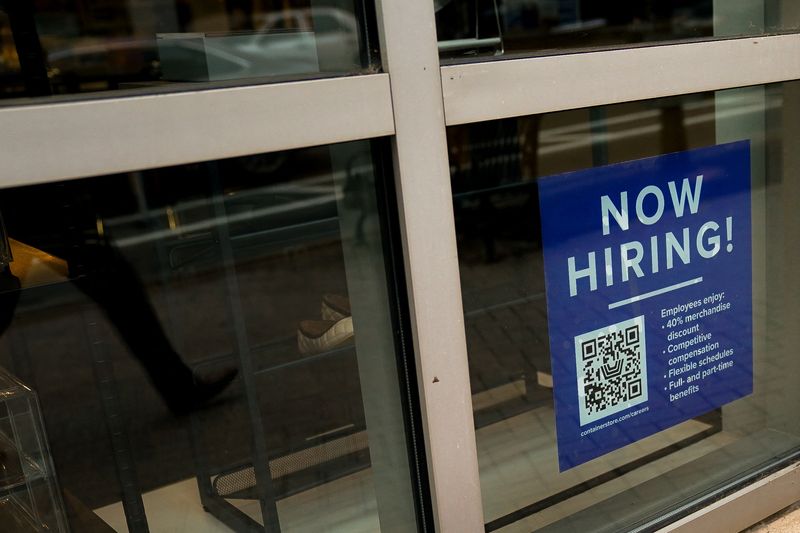US labor market cooling as job openings, quits decline
2023.08.29 12:33

© Reuters. FILE PHOTO: An employee hiring sign with a QR code is seen in a window of a business in Arlington, Virginia, U.S., April 7, 2023. REUTERS/Elizabeth Frantz
By Lucia Mutikani
WASHINGTON (Reuters) -U.S. job openings dropped to the lowest level in nearly 2-1/2 years in July as the labor market gradually slows, bolstering expectations that the Federal Reserve will keep interest rates unchanged next month.
The Job Openings and Labor Turnover Survey, or JOLTS report, from the Labor Department on Tuesday also showed the number of people quitting their jobs dropping to levels last seen in early 2021, indicating Americans were becoming less confident in the labor market.
That was reinforced by a survey from the Conference Board showing consumers’ perceptions of the labor market cooling in August. Nevertheless, labor market conditions remain tight, with 1.5 job openings for every unemployed person in July. Layoffs remain very low by historical standards.
“Although the labor market is still tight, the degree of excess demand is declining and is coming about through companies reducing the number of vacancies rather than increasing layoffs and unemployment,” said Conrad DeQuadros, senior economic advisor at Brean Capital in New York. “There is plenty here to make the case that not only is the labor market rebalancing but at this point it is doing so without pushing up unemployment.”
Job openings, a measure of labor demand dropped 338,000 to 8.827 million on the last day of July, the lowest level since March 2021. Economists polled by Reuters had forecast 9.465 million job openings in July.
The decrease was led by the professional and business services sector, where job openings dropped 198,000. There were 130,000 fewer vacancies in healthcare and social assistance, while open positions fell 67,000 in state and local government,
excluding education.
State and local government education job openings declined 62,000 and there were 27,000 fewer vacancies in federal government. But unfilled jobs increased 101,000 in the information sector. There were an additional 75,000 open positions in transportation, warehousing and utilities.
The job openings rate fell to 5.3% from 5.5% in June.
U.S. stocks were trading higher. The dollar slipped against a basket of currencies. U.S. Treasury prices rose.
CONDITIONS STILL TIGHT
The labor market has largely been resilient despite 525 basis points in interest rate hikes from the Fed since March 2022, in part as employers filled positions, which opened up during the COVID-19 pandemic.
Companies have also been reluctant to lay off workers after experiencing difficulties finding labor during the pandemic. At 3.5% in July, the unemployment rate was near levels last seen more than 50 years ago.
But the jobless rate could creep up in August. The Conference Board’s so-called labor market differential, derived from data on respondents’ views on whether jobs are plentiful or hard to get, narrowed to 26.2% this month from 32.4% in July. This measure correlates to the unemployment rate in the Labor Department’s closely followed employment report.
Fed Chair Jerome Powell said at the annual Jackson Hole Economic Policy Symposium last Friday that the U.S. central bank “will proceed carefully as we decide whether to tighten further or, instead, to hold the policy rate constant and await further data.” Financial markets expect the Fed will leave its benchmark overnight interest rate unchanged at the Sept. 19-20 policy meeting, according to the CME Group’s (NASDAQ:) FedWatch Tool.
The JOLTS report showed hiring dropped 167,000 to 5.773 million. That lowered the hires rate to 3.7% from 3.8% in June.
Resignations decreased 253,000 to 3.549 million, the lowest level since February 2021. Fewer people job-hopping could help restrain wage inflation. The quits rate, viewed as a measure of labor market confidence, fell to 2.3% from 2.4% in June.
Layoffs and discharges were little changed at 1.555 million.








